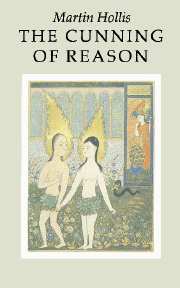Book contents
- Frontmatter
- Contents
- Preface
- 1 The sovereign artificer
- 2 Rational choice
- 3 Norms and institutions
- 4 The Cunning of Reason I: unintended consequences
- 5 Motivation
- 6 External and internal reasons
- 7 Rational Expectations
- 8 Maximising and satisficing
- 9 The Cunning of Reason II: functions and rules
- 10 Reasons and roles
- 11 Rationality and understanding
- 12 The Cunning of Reason III: self and society
- Bibliography
- Index
7 - Rational Expectations
Published online by Cambridge University Press: 15 December 2009
- Frontmatter
- Contents
- Preface
- 1 The sovereign artificer
- 2 Rational choice
- 3 Norms and institutions
- 4 The Cunning of Reason I: unintended consequences
- 5 Motivation
- 6 External and internal reasons
- 7 Rational Expectations
- 8 Maximising and satisficing
- 9 The Cunning of Reason II: functions and rules
- 10 Reasons and roles
- 11 Rationality and understanding
- 12 The Cunning of Reason III: self and society
- Bibliography
- Index
Summary
The role of rational belief in rational choice is strengthened by switching from a Humean to a Kantian account of reasons for action. Instead of just serving the passions, it directs them by requiring the agent to ask what would happen if everyone so placed did the same. This is usually regarded as a moral requirement, plausible if the topic is what life would be like in a world where all did what they should, but irrelevant if we are trying to model a world where all allocate resources rationally. I have been attempting to undermine the distinction by suggesting that there is something amiss with a theory of rational choice which allows each individually rational allocation to sum to an outcome foreseeably inferior for everyone. That invites some sort of universalisability as a test of rational choice. Even so, however, I doubt if readers are so far inclined to construe belief about what it is rational to do on a model of belief about what it is moral to do.
One deep reason for reluctance is a conviction that rational belief and moral belief have a quite different relation to matters of fact. Even in the present nuanced state of the philosophy of science, it remains crucial that believing something so does not make it so. Rational belief is belief suitably attuned to an independent world, whose states and events are a test. Even if there are no theory-neutral facts, nature is not thereby turned into human handiwork. A modern King Canute cannot stem the tide by reconceptualising it; a modern Newton is still conscious of casting pebbles into an unknown ocean.
- Type
- Chapter
- Information
- The Cunning of Reason , pp. 97 - 112Publisher: Cambridge University PressPrint publication year: 1988



